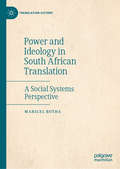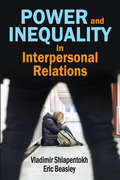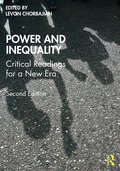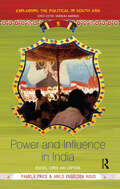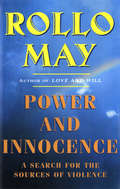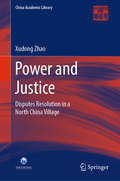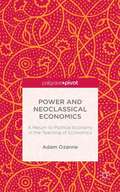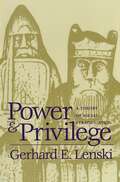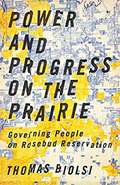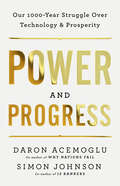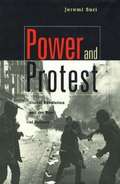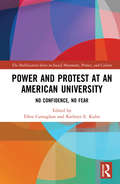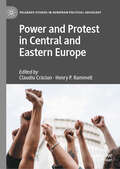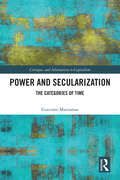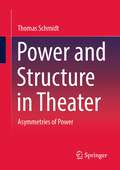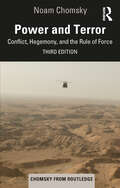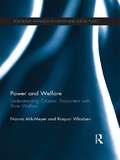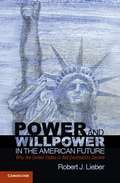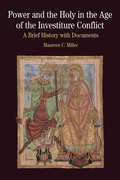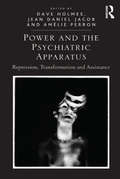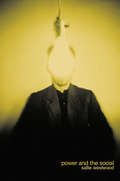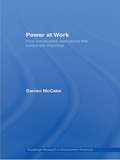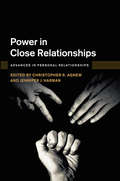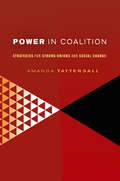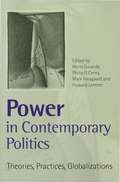- Table View
- List View
Power and Ideology in South African Translation: A Social Systems Perspective (Translation History)
by Maricel BothaThis book provides a social interpretation of written South African translation history from the seventeenth century to the present, considering how trends involving various languages have reflected ideologies and unequal power relations and focusing attention on translation’s often hidden social operation. Translation is investigated in relation to colonial mercantilism, scientific knowledge of extraction, Christian missionary conversion, Islamic education, various nationalisms, apartheid oppression and the anti-apartheid struggle, neoliberalism, exclusion and post-apartheid social transformation by employing Niklas Luhmann’s social systems theory. This book will be an essential resource for scholars, graduate students, and general readers who are interested in or work on the history and practice of translation and its cultural agents in the South African context.
Power and Inequality in Interpersonal Relations
by Vladimir Shlapentokh Eric BeasleyThis book explores interpersonal situations in which weak or vulnerable people find themselves and the ways in which others help create, sustain, and eradicate such social dynamics. Vladimir Shlapentokh and Eric Beasley demonstrate that people can gain power over each other and then abuse this power because of unequal resource conditions. The authors define resources as the means necessary for satisfaction or achievement of needs or goals, such as wealth, physical strength, intellectual capacity and information, sexual attractiveness, and status. This volume is different from existing social science books on inequality and vulnerability, which address relations between people of different social positions, races, genders, ages, and places of residence confronting each other in political, economic, and cultural battles. This book focuses on people who become the victims of those whom they know personally-relatives, colleagues, neighbors. The authors argue that unequal resource distribution among members of social units is the main cause of conflict and ultimately creates situations where members of a social unit can abuse other members of the same unit.
Power and Inequality: Critical Readings for a New Era
by Levon ChorbajianSuccessfully bringing together accessible readings that cover the broad range of issues of importance to those studying politics and society, this new edition of Power and Inequality provides a unique mix of theoretical and empirical pieces, such as state and electoral politics, that address both classic issues in political sociology and more recent developments, such as globalization. With strong integration of race and gender throughout, this collection offers a coherent analysis of power that reflects the contributions of a variety of critical perspectives, including Marxism, feminism, critical race theory, postmodernism, and power structure theory.
Power and Influence in India: Bosses, Lords and Captains (Exploring the Political in South Asia)
by Pamela Price Arild Engelsen RuudTaking cognisance of the lack of studies on leadership in modern India, this book explores how leadership is practiced in the Indian context, examining this across varied domains — from rural settings and urban neighbourhoods to political parties and state governments. The importance of individual leaders in the projection of politics in South Asia is evident from how political parties, mobilisation of movements and the media all focus on carefully constructed personalities. Besides, the politically ambitious have considerable room for manoeuvre in the institutional setup of the Indian subcontinent. This book focuses on actors making their political career and/or aspiring for leadership roles, even as it also foregrounds the range of choices open to them in particular contexts. The articles in this volume explore the variety of strategies used by politically engaged actors in trying to acquire (or keep) power — symbolic action, rhetorical usage, moral conviction, building of alliances — illustrating, in the process, both the opportunities and constraints experienced by them. In taking a qualitative approach and tracking both political styles and transactions, this book provides insights into the nature of democracy and the functioning of electoral politics in the subcontinent.
Power and Innocence: A Search for the Sources of Violence
by Rollo MayStressing the positive, creative aspects of power and innocence, Rollo May offers a way of thinking about the problems of contemporary society. Rollo May defines power as the ability to cause or prevent change; innocence, on the other hand, is the conscious divesting of one's power to make it seem a virtuea form of powerlessness that Dr. May sees as particularly American in nature. From these basic concepts he suggests a new ethic that sees power as the basis for both human goodness and evil. Dr. May discusses five levels of power's potential in each of us: the infant's power to be; self-affirmation, the ability to survive with self-esteem; self-assertion, which develops when self-affirmation is blocked; aggression, a reaction to thwarted assertion; and, finally, violence, when reason and persuasion are ineffective.
Power and Justice: Disputes Resolution in a North China Village (China Academic Library)
by Xudong ZhaoThis book discusses the relationship, interaction and conflict between everyday life and various institutions in a specific village in North China, with a focus on the formal and informal legal systems. It vividly describes the village’s “legal construction problems” as well as the customs and laws, and such it can be seen as a historical and innovative comment on China’s problems. The book is based on the author’s field investigations assessing vast amounts of material concerning local organizations, formal and informal authorities, economic exchange, religious rituals, as well as interviews with villagers and numerous court files. It presents an in-depth exploration of “pluralism of authority” in China’s rural society, and examines how various authorities were formed. It also summarizes how various local disputes are resolved and discusses the villagers’ understanding of the concept of “justice.” Lastly, it suggests ways in which national law and local customs could communicate and collaborate.
Power and Neoclassical Economics: A Return to Political Economy in the Teaching of Economics
by Adam OzannePower and Neoclassical Economics.
Power and Privilege
by Gerhard E. LenskiPower and Privilege seeks to answer the central question of the field of social stratification: Who gets what and why? Using a dialectical view of the development of thought in the discipline, Gerhard Lenski describes the outlines of an emerging synthesis of theories. He shows that perspectives as diverse and contradictory as those of Marx, Spencer, Sumner, Veblen, Mosca, Pareto, Sorokin, Parsons, and Dahrendorf are parts of an evolving and systematic body of theory.
Power and Progress on the Prairie: Governing People on Rosebud Reservation
by Thomas BiolsiA critical exploration of how modernity and progress were imposed on the people and land of rural South Dakota The Rosebud Country, comprising four counties in rural South Dakota, was first established as the Rosebud Indian Reservation in 1889 to settle the Sicangu Lakota. During the first two decades of the twentieth century, white homesteaders arrived in the area and became the majority population. Today, the population of Rosebud Country is nearly evenly divided between Indians and whites. In Power and Progress on the Prairie, Thomas Biolsi traces how a variety of governmental actors, including public officials, bureaucrats, and experts in civil society, invented and applied ideas about modernity and progress to the people and the land. Through a series of case studies—programs to settle &“surplus&” Indian lands, to &“civilize&” the Indians, to &“modernize&” white farmers, to find strategic sites for nuclear missile silos, and to extend voting rights to Lakota people—Biolsi examines how these various &“problems&” came into focus for government experts and how remedies were devised and implemented.Drawing on theories of governmentality derived from Michel Foucault, Biolsi challenges the idea that the problems identified by state agents and the solutions they implemented were inevitable or rational. Rather, through fine-grained analysis of the impact of these programs on both the Lakota and white residents, he reveals that their underlying logic was too often arbitrary and devastating.
Power and Progress: Our Thousand-Year Struggle Over Technology and Prosperity
by Simon Johnson Daron AcemogluThe bestselling co-author of Why Nations Fail and the bestselling co-author of 13 Bankers deliver a bold reinterpretation of economics and history that will fundamentally change how you see the world A thousand years of history and contemporary evidence make one thing clear: progress depends on the choices we make about technology. New ways of organizing production and communication can either serve the narrow interests of an elite or become the foundation for widespread prosperity. The wealth generated by technological improvements in agriculture during the European Middle Ages was captured by the nobility and used to build grand cathedrals, while peasants remained on the edge of starvation. The first hundred years of industrialization in England delivered stagnant incomes for working people. And throughout the world today, digital technologies and artificial intelligence undermine jobs and democracy through excessive automation, massive data collection, and intrusive surveillance. It doesn&’t have to be this way. Power and Progress demonstrates the path of technology was once—and may again—be brought under control. Cutting-edge technological advances can become empowering and democratizing tools, but not if all major decisions remain in the hands of a few hubristic tech leaders. With their bold reinterpretation of economics and history, Daron Acemoglu and Simon Johnson fundamentally change how we see the world, providing the vision needed to redirect innovation so it again benefits most people.
Power and Protest
by Jeremi SuriJeremi Suri puts the tumultuous 1960s into a truly international perspective in the first study to examine the connections between great power diplomacy and global social protest.
Power and Protest at an American University: No Confidence, No Fear (The Mobilization Series on Social Movements, Protest, and Culture)
by EllenKathryn Carnaghan E. KuhnThis book examines the successful no-confidence movement led by faculty at Saint Louis University in 2013 in an effort to unseat the university president, considering the reasons for success when similar movements often fail. Through a series of chapters written by faculty from many disciplines at the university, it uses a particular episode of faculty protest to shed light on wider issues concerning the circumstances in which faculty are likely to be motivated to protest, the institutional frameworks that make protest possible and the strategies that get results. As such, it will appeal to scholars of social movements with interests in protest and mobilization in the field of education.
Power and Protest in Central and Eastern Europe (Palgrave Studies in European Political Sociology)
by Claudiu Crăciun Henry P. RammeltThis book offers a detailed overview of the politics of contemporary social movements in Central and Eastern Europe. The analysis of 11 countries reveals the relevance of protest events, social movements, and civil society in shaping democratic transition and consolidation, electoral politics and institutions, socio-economic policies, and geopolitical orientation. This volume shows how power structures and government institutions respond to civic mobilisations and protests, using diverse tactics ranging from co-option to repression and how protests and mobilisations became consequential in the region's politics.
Power and Secularization: The Categories of Time (Critiques and Alternatives to Capitalism)
by Giacomo MarramaoThis book offers a geneaological understanding of the condition of our time by reconstructing the complex story of the transition from the "cyclical time" of the classic era to the "linear and infuturant time" of the modern world. Time is therefore understood not as a simple vector, but as a trans-political form par excellence, which involves the fundamental philosophical and political categories of the modern constellation: beginning with the concepts of progress, revolution, liberation, and alternative.Arguing that the process of secularization (in its broadest sense) is dependent on the modern notion of cumulative and irreversible time—together with the temporalization of history—Power and Secularization constitutes a conceptual history that will appeal to scholars of social and political theory and philosophy with interests in intellectual history and the genealogical method.
Power and Structure in Theater: Asymmetries of Power
by Thomas SchmidtStructure and power are two defining and interrelated aspects of the German theater business. It is based on the strictly hierarchical organization of 1900 and has undergone hardly any structural changes since then. This not only impairs the innovative capacity of this important institution, but also leads to inappropriately strong power positions of the directors, to conflicts with the ensembles and employees, and hinders the development and renewal of the artistic potentials of this cultural technique. The publication is based on the results of the study 'Art and Power in the Theater' - with 1966 participants the largest study of its kind. The contentPower as a decision-making and management tool in the theaterThe connection between power and organizationPower and abuse in the theaterStructural power and forms of power containmentResults of the study The target groupsStudents, teachers and researchers in the fields of cultural management, cultural and theater studies, dramaturgy, psychology, sociology and anthropology,employees of management at the theater and other cultural organizationThe authorThomas Schmidt has been professor and director of the Theater and Orchestra Management program in Frankfurt since 2010. He was managing director of the National Theater Weimar from 2003 to 2013 and visiting professor at Harvard University in 2014.
Power and Terror: Conflict, Hegemony, and the Rule of Force (Chomsky from Routledge)
by Noam ChomskyIn this pertinent book, Noam Chomsky examines the imbalanced dynamics of international power relations and the use of state terror by the United States and other Western powers in the Middle East in the post-9/11 era. This edition features new forewords by Fred Branfman and Chris Hedges reasserting the enduring importance of Chomsky’s work and extending Chomsky’s analysis to recent developments in the Middle East.Chomsky explores international relations since World War II to demonstrate that contemporary acts of terrorism cannot be understood outside the context of Western power and state terror throughout the world, particularly in the Middle East. In doing so, Chomsky demonstrates that state terror is intrinsic to U.S. foreign policy and fundamental in the maintenance of Western hegemony throughout the so-called War on Terror, including throughout the Obama administration.This new edition offers a vital critique of U.S. foreign policy and its reliance on acts of terror to maintain its hegemony in the Middle East. It will therefore be vital reading for those who wish to understand the grim realities of Western foreign policy.
Power and Welfare: Understanding Citizens' Encounters with State Welfare (Social And Political Power Mup Ser.)
by Nanna Mik-Meyer Kaspar VillardsenIn the welfare provision of today, power takes both the shape of juridical sanctions and of attractive offers for self-development. When state institutions punish criminals, remove children at risk, or enforce sanctions upon welfare recipients the question of power is immediately urgent. It is less readily evident that power is at stake when institutions educate, counsel or ‘empower’ citizens. This book offers a framework for understanding and analyzing these complex and implicit forms of power at play in the encounters between citizens and welfare institutions. Taking as its starting point the idea that power takes many different shapes, and that different approaches to power may be necessary in the diverse contexts where citizens encounter welfare professionals, the book demonstrates how significant social theorists, spanning from Goffman to Foucault, can be used for inquiries into these encounters. Guiding the reader from their epistemological foundations to lucid ‘state of the art’ case examples, the book unpacks each of its six theoretical perspectives, and explains selected key concepts and explicates their potential for analysis. The final chapter discusses the usefulness of the theoretical approaches, their weaknesses and indicates some possibilities of theoretical integration. Including case studies of patients, nursing home residents, unemployed people, homeless people, and young offenders, from the USA, Denmark, France, Sweden, Canada, and Australia, Power and Welfare is designed for students and researchers of social policy, sociology, anthropology, political science, education, nursing and social work.
Power and Willpower in the American Future
by Robert J. LieberTo argue against the widely proclaimed idea of American decline, as this book does, might seem a lonely task. After all, the problems are real and serious. Yet if we take a longer view, much of the discourse about decline appears exaggerated, hyperbolic, and ahistorical. Why? First, because of the deep underlying strengths of the United States. These include not only size, population, demography, and resources, but also the scale and importance of its economy and financial markets, its scientific research and technology, its competitiveness, its military power, and its attractiveness to talented immigrants. Second, there is the weight of history and of American exceptionalism. Throughout its history, the United States has repeatedly faced and eventually overcome daunting challenges and crises. Contrary to a prevailing pessimism, there is nothing inevitable about American decline. Flexibility, adaptability, and the capacity for course correction provide the United States with a unique resilience that has proved invaluable in the past and will do so in the future. Ultimately, the ability to avoid serious decline is less a question of material factors than of policy, leadership, and political will.
Power and the Holy in the Age of the Investiture Conflict: A Brief History With Documents
by Maureen C. MillerHistorians tracing the emerging division between church and state in the West have long recognized the importance of the eleventh-century Gregorian reform movement and the investiture conflict — events that reached a dramatic climax in Pope Gregory VII’s excommunication of Emperor Henry IV. In her introduction to this ground-breaking volume, Miller recasts the narrative of reform and the investiture conflict — traditionally portrayed as an elitist struggle between church and state — in terms of a broad shift in conceptions of the nature of power and the holy. The volume brings together a wide selection of compelling documents — many of which have been largely unavailable — that allows students to place the investiture conflict within the wider context of social and political change in medieval Europe. Document headnotes, a chronology, a selected bibliography, and questions for consideration provide further pedagogical support.
Power and the Psychiatric Apparatus: Repression, Transformation and Assistance
by Dave Holmes Jean Daniel JacobDrawing on a broad range of approaches in the fields of sociology, anthropology, political science, history, philosophy, medicine and nursing, Power and the Psychiatric Apparatus exposes psychiatric practices that are mobilized along the continuum of repression, transformation and assistance. It critically examines taken for granted psychiatric practices both past and current, shedding light on the often political nature of psychiatry and reconceptualizing its central and sensitive issues through the radical theory of figures such as Foucault, Deleuze and Guattari, Goffman, and Szasz. As such, this ground-breaking collection embraces a broad understanding of psychiatric practices and engages the reader in a critical understanding of their effects, challenging the discipline’s altruistic rhetoric of therapy and problematizing the ways in which this is operationalized in practice. A comprehensive exploration of contested psychiatric practices in healthcare settings, this interdisciplinary volume brings together recent scholarship from the US, Canada, the UK, Europe and Australia, to provide a rich array of theoretical tools with which to engage with questions related to psychiatric power, discipline and control, while theorizing their workings in creative and imaginative ways.
Power and the Social
by Dr Sallie Westwood Sallie WestwoodLooking at the different ways power has been theorised from Hobbes to Giddens, this book analyzes the ways in which the theories have been applied. By bringing together theory and substantive analysis, this invaluable introductory text provides a clear and imaginative account of power and power relations. Processes and structures of power are analyzed within key areas of sociological concern, including:* the history of power* race* gender* class* sexuality* the spatial and visual.Investigating a wide range of cases from across the globe, including the 'underclass' in Britain, the power of the military in Latin America, the untouchables in India and the politics of new reproductive technologies, Dr Sallie Westwood adopts a popular approach to the subject, looking at the processes of power as well as structure and at how they function in everyday life.
Power at Work: How Employees Reproduce the Corporate Machine (Routledge Research In Employment Relations Ser.)
by Darren McCabeProviding detailed insights into working life, McCabe, a well known author in the fields of organization studies, labour process theory and critical management studies offers a distinctive approach to innovation in the work place. In this ethnography of a major US bank he argues that many innovations associated with thenew corporation seem to re
Power in Close Relationships (Advances in Personal Relationships)
by Christopher R. Agnew Jennifer J. HarmanPower is an inherent feature of social interactions, yet it is hard to define and therefore understand. This book is the first to organize current interdisciplinary theorizing and research about power from leading academics in areas such as social psychology, communications, family studies, and public health. It also focuses exclusively on how power operates and affects close relationship processes, while the theoretical insights provided point the way toward new lines of research and understanding. Using specific examples to illustrate complex theoretical explanations and supplying thorough descriptions of the existing literature on power in close relationships, this book is an essential resource for researchers, professionals, students, or laypeople seeking to better understand how power operates in those relationships that are most important to us.
Power in Coalition: Strategies for Strong Unions and Social Change
by Amanda TattersallThe labor movement sees coalitions as a key tool for union revitalization and social change, but there is little analysis of what makes them successful or the factors that make them fail. Amanda Tattersall-an organizer and labor scholar-addresses this gap in the first internationally comparative study of coalitions between unions and community organizations. Tattersall argues that coalition success must be measured by two criteria: whether campaigns produce social change and whether they sustain organizational strength over time. The book contributes new, practical frameworks and insights that will help guide union and community organizers across the globe. The book throws down the gauntlet to industrial relations scholars and labor organizers, making a compelling case for unions to build coalitions that wield "power with" community organizations. Tattersall presents three detailed case studies: the public education coalition in Sydney, the Ontario Health Coalition in Toronto, and the living wage campaign run by the Grassroots Collaborative in Chicago. Together they enable Tattersall to explore when and how coalition unionism is the best and most appropriate strategy for social change, organizational development, and union renewal. Power in Coalition presents clear lessons. She suggests that "less is more," because it is often easier to build stronger coalitions with fewer organizations making decisions and sharing resources. The role of the individual, she finds, is traditionally underestimated, even though a coalition's success depends on a leader's ability to broker relationships between organizations while developing the campaign's strategy. The crafting of goals that combine organizational interest and the public interest and take into account electoral politics are crucial elements of coalition success. For more about Power in Coalition, visit the author's wesbite: http://powerincoalition. com.
Power in Contemporary Politics: Theories, Practices, Globalizations
by Mark Haugaard Philip G. Cerny Howard H. Lentner Henri GoverdeThis major book provides an up-to-date and state-of-the-art overview of the contemporary theory and practice of the most central concept in political science: power. The concept of political power is introduced within a three-part framework: contemporary theories of power; applications of power processes and practices; and the implications of modern power flows across the globe today. The book explores the many structures of power in the contemporary world from theories of its construction and use, to its operation in policy networks, and its wider exercise at different levels in the political process, from the local to the global. Amongst the many themes explored are the reproduction and the legitimization of power, the dynamics of resistance and coercion, the concepts of private and public power, and the impact of globalization processes and subsequent shifting power arrangements. Combining diverse perspectives and different tools of analysis, this book represents the most comprehensive treatment of political power published in the last fifteen years. It will be essential reading for academics and students alike across political science, international studies and political sociology.
